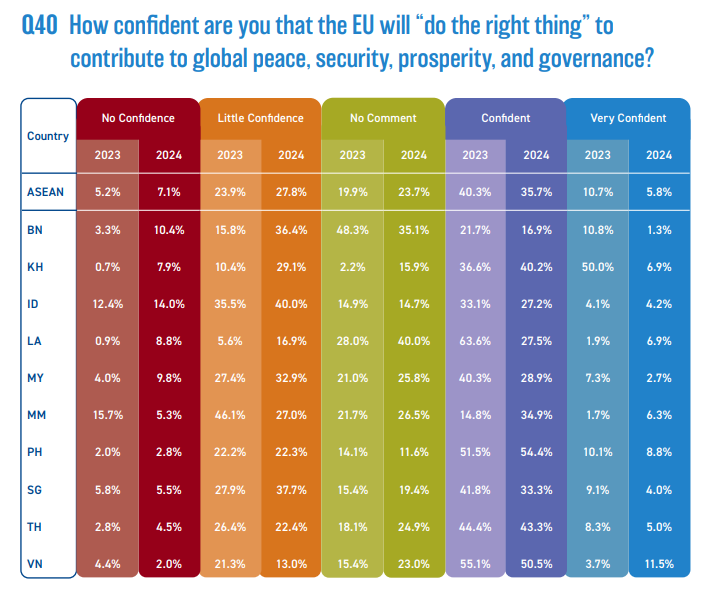WEEK IN BRIEF: EU's Reputation in Southeast Asia Dips
Plus a round-up of the week's news on Europe-Southeast Asia relations.
Tweet @davidhuttjourno or @WatchingEUASEAN |
Good morning! Welcome to the latest “Week In Brief” edition of Watching Europe In Southeast Asia, written by journalist and columnist David Hutt.
As well as weekly news briefs about Europe-Southeast Asia engagement, this newsletter also brings you exclusive analysis and in-depth Q&As with leading diplomats and businesspeople from both regions.
If you haven’t already, you can become a supporter of Watching Europe In Southeast Asia.
The annual State of Southeast Asia survey, produced by the ASEAN Studies Centre at ISEAS – Yusof Ishak Institute, has just been released. It’s a poll of Southeast Asian “elites”, so make of that what you will. However, the glaring picture it gave was that the EU’s reputation in the region had declined over the past 12 months.
For instance, Q27 asked: “Who do you have the most confidence in to champion the global free trade agenda?” In 2023, some 17.6% of ASEAN respondents said the EU. It was down to 13.9% in 2024. What about, “Who do you have the most confidence in to provide leadership to maintain the rules-based order and uphold international law”. In 2023, 23% said the EU, the second-highest, after the United States. In 2024, however, only 16.9% said they trusted the EU in this regard, which sent it down to third place.
The main metric was Q40: “How confident are you that the EU will ‘do the right thing’ to contribute to global peace, security, prosperity, and governance?” In 2023, 51% said they were “confident” or “very confident”. Now, it’s about 41%. In fact, the score for “very confident” halved. The pollsters narrowed down on those who had no confidence in the EU. For the most part, respondents didn’t change their reasons why compared to last year. A similar percentage of Southeast Asian elites distrusted the EU because they thought it was distracted by other global issues or because of its environmental policies. Except, that is, for the option: “My country’s political culture and worldview are incompatible with the EU’s.” In 2023, some 9.2% of respondents said this; it was 16.5% in 2024.
There’s a lot more narrowing down one could do from these survey results, especially breaking down the scores by country. For instance, return to the question, “How confident are you that the EU will ‘do the right thing’ to contribute to global peace, security, prosperity, and governance?” Whereas, as we saw, the regional averages saw a major decline in trust in the EU, country-based the picture is different. Take those respondents who said they were “very confident” in the EU’s ability to do the right thing. In fact, the percentages increased this year among Indonesians, Laotians, Burmese, and Vietnamese. It declined for the rest, but the regional average seems to be skewed by Cambodians. In 2023, some 50% of Cambodians said they were “very confident” that the EU would do the right thing in terms of global peace, security, etc. But it was down to 6.9% in 2024, which seems a little odd given that Europe-Cambodia relations have actually improved over the past 12 months.
— The European Parliament’s latest special edition supplement, in partnership with the EU Neighbourhood Monitor, launched by the MEP Lars Patrick Berg, focuses on the future of the EU-ASEAN partnership.
— Bne IntelliNews looked at Southeastern European countries looking to attract migrant workers from Southeast Asia. “It was reported at the end of March that a new agency dedicated to the employment of Filipino workers has started operations in Slovenia, with plans to employ over a thousand Filipinos every year.” (Southeast Europe urgently recruiting from developing Asia ahead of summer season).
— “The Indonesian Navy signed a contract to buy two "Scorpene" submarines made by French state-owned shipyard Naval Group” (Indonesia buys two submarines from France, Jakarta Post)
— “With no major roadblocks seen, the free trade agreement (FTA) between the Philippines and the 27-member bloc European Union (EU) could be signed within three years, according to the EU-Asean Business Council. (EU-Asean council sees 3-year timeline for PHL-EU pact)
— “To what extent can the EU exert normative pressure on the Association of Southeast Asian Nations (ASEAN)”. An interesting report by Natthanan Kunnamas and Bernardo Venturi on the disparities between the EU’s values and economic “normative” pressure on Southeast Asia.
— “By 2025, about 30 per cent of the global economy could be mediated by digital platform-based companies. In a push to regulate these companies, there is a divergence between Europe's stricter controls and some Asian nations like Singapore favour a balanced approach to help nurture growth and innovation.” (Faizal Bin Yahya, Regulating digital platforms in Southeast Asia, East Asia Forum).
— “Germany has consistently ranked as a top trade and investment partner, and 2023 was a record-breaking year. Foreign direct investment (FDI) from Germany soared to a staggering USD 149.89 million, the highest since 2005. (Philippines and Germany celebrate record investments and bilateral cooperation at 2nd Joint Economic Commission Meeting)
—The EU-ASEAN Forum is taking place on April 16. Find out more info here.
Southeast Asian countries consider ways to boost ‘green financing’ as region chokes on smog, AP
Soaring German investments are testament to trust in Vietnam, Vietnam Investment Review
Indonesian police probe trafficking network exploiting practical training scheme in Germany, Bernama
UN Report: Illegal waste trafficking targets SE Asia, most notably Malaysia, Indonesia, Thailand and Vietnam, Malay Mail
That’s it for this week. Next week, I’ll have In Conversations with Igor Driesmans, the EU ambassador to Cambodia, and a Q&A about why more and more Southeast Asians are learning German. Have a good weekend.




